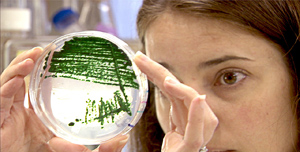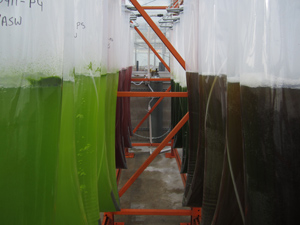Biofuels Certificate Program Trains Workers for New Jobs in State’s Green Economy
By:
Published Date
Article Content

UC San Diego biologists are developing ways to produce fuel from algae and other plants. Credit: UC San Diego
The first 50 graduates of an innovative program funded by the State of California to retrain workers for the new green economy received their certification today to work as general science technicians in the rapidly expanding biofuels industry in the San Diego and Imperial County region. Thirteen of the graduates and other EDGE participants have already landed jobs or are headed to graduate school for further training.
“With this training, these students are prepared to support the region's growing biofuels companies and help San Diego continue to be a leader in the biofuels sector,” said Jason Anderson, vice president of CleanTECH San Diego, a non-profit organization that is helping to accelerate San Diego as a world leader in the clean technology economy.
“This program is not only training workers for new jobs in the local economy, it will eventually help our nation become less dependent on foreign oil,” said Stephen Mayfield, a professor of biology at UC San Diego and director of the San Diego Center for Algae Biotechnology, or SD-CAB. “The bioenergy sector will eventually be creating millions of jobs nationwide. Our biggest challenge will be to keep those jobs in California.”
The students, who began their technical training earlier this spring with classes at UC San Diego Extension and Mira Costa College, are the first graduates of a program funded by a two-year, $4-million grant from the state’s Department of Labor under the EDGE Initiative—Educating and Developing workers for the Green Economy. The grant involves the work of a number of local partners, which include UC San Diego, San Diego State University, Mira Costa College, SD-CAB, CleanTECH San Diego, BIOCOM Institute, BIOCOM, San Diego Workforce Partnership and the San Diego Regional Economic Development Corporation.

Bags of green and red algae are used by UC San Diego researchers to develop the best strains for producing biofuels. Credit: UC San Diego
Graduates of the program are eligible for paid, full-time internships lasting from four to eight weeks at biofuels and industrial biotechnology companies within San Diego and Imperial counties. The costs of those internships are also paid by the grant.
San Diego is widely recognized as one of the world’s leaders in biofuels research and development. A recent analysis, conducted by SANDAG, found that for the algal biofuels sector alone, the industry provides the region with 410 direct jobs and $56 million in direct economic activity and $108 million in total economic activity annually.
“It’s critical that we build the research and development infrastructure for the biofuels industry here,” said Mayfield. “Right now, we have a head start on the rest of the world and we can’t afford to lose that.”
Thanks to the $4-million EDGE grant, San Diego has also become a national leader in training biofuels technicians. Mayfield said feedback from the program’s graduates, faculty and local biofuels companies will lead to a redesign of the curriculum for the next class of science biofuels technicians, which will run from March through August of 2012. Once the program is perfected, an on-line, web-based curriculum will be made available to any California university or college, and through enrollment in UC San Diego Extension to anyone around the world who wants to gain basic science training to enter the biofuels industry.
“Nationwide there is a need for skilled workers to participate in the development and commercialization of new technologies, as we can see in the field of alternative energies,” said Hugo Villar, director of science and technology at UC San Diego Extension. “The university has been a leader in helping adult learners acquire new knowledge and skills that allow them to transition out of stagnant areas of the job market and participate into more vibrant areas as we are doing now with biofuels.”
The EDGE grant is also supporting the development next year of a master’s degree in bioenergy at UC San Diego, a partnership between the university’s Division of Biological Sciences and the Rady School of Management.
Prospective students interested in applying for next year’s EDGE program and biofuels and industrial biotechnology companies interested in hiring interns from the program should contact Karen Overklift at the BIOCOM Institute (858) 455-0300, extension 104 or koverklift@biocom.org
Share This:
Stay in the Know
Keep up with all the latest from UC San Diego. Subscribe to the newsletter today.



